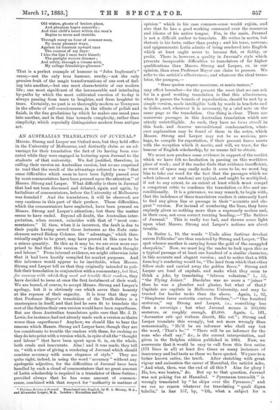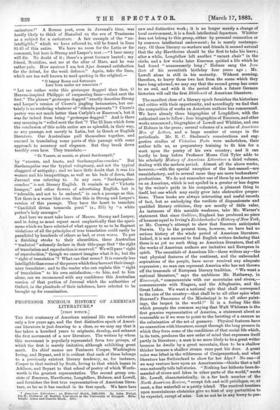AN AUSTRALIAN TRANSLATION OF JUVENAL.* MEssas. Strong and Leeper are
Oxford men, but they hold office in the University of Melbourne, and distinctly claim as an ad- vantage for their translation the fact of its having been exe- cuted while they were engaged in lecturing upon Juvenal to the students of that university. We feel justified, therefore, in calling their version an Australian version, but we are surprised to read that the result of the advantage referred to was "that some difficulties which seem to have been lightly passed over by most commentators have been pressed upon the attention" of Messrs. Sfrong and Leeper. What difficulty is there in Juvenal that had not been discussed and debated, again and again, by battalions of commentators, before the University of Melbourne was founded ? And the translators, it will be observed, are very cautious in this part of their preface. These difficulties, which the commentators have neglected, have been pressed on Messrs. Strong and Leeper's attention; but there the matter seems to have ended. Beyond all doubt, the Australian inter- pretation, when correct, coincides with that of "most com- mentators." If, then, when it is incorrect, the fault is due to their pupils having served these lecturers as the Zulu cate- chumen served Bishop Colenso, the " advantage," which theo- retically ought to be great, may have proved in this case to be a minus quantity. Be this as it may be, we are even more sur- prised to find that this version "is the fruit of much thought and labour." From internal evidence, we might otherwise infer that it had been hastily compiled for market purposes. And this inference would appear to be inevitable, when Messrs. Strong and Leeper tell us that they originally intended to pub- lish their translation in conjunction with a commentary, but that, for reasons with which, they need not trouble their readers, they have decided to issue at once the first instalment of their work. We are bound, of course, to accept Messrs. Strong and Leeper's apology, but it is obviously one which saves their honesty at the expense of their sagacity. It is true that they say that Professor Mayor's translation of the Tenth Satire is a masterpiece in itself, and that had he seen fit to translate the rest of the Satires their own version would have been superfluous. That are these Australian translators quite sure that Mr. J. D. Lewis, for instance, had not already made such a version as theirs worse than superfluous ? Anyhow, we should like to hear the reasons which Messrs. Strong and Leeper have, though they are too considerate to trouble the readers with them, for rushing as they do into print with aversion which, in spite of all the "thought and labour" that have been spent upon it, is, on the whole, both crude and inaccurate. Alas ! and it was made, they tell us, "with a view of giving a rendering of Juvenal which should combine accuracy with some elegance of style." They are quite right, indeed, in using the word " accuracy " without any apologetic adjective, for the difficulties of Juvenal have been handled by such a cloud of commentators that no great amount of Latin scholarship is required in a translator of these Satires ; provided always that he has some amount of common- sense, combined with that respect for "authority in matters of
• Thirf eve &tires rj Juvenal. Translated into English, by H. A. Strang, M.A., sad Alexander Leoper, M.A. London Macmillan and Co.
opinion" which in his case common-sense would enjoin, and also that he has a good working command over the resources and idioms of his native tongue. For, in the main, Juvenal is not a difficult author to translate. He writes in metre, but rhetoric is his forte, rather than poetry ; and his terse, nervous,. and epigrammatic Latin admits of being rendered into English_ which at least ought never to become flat, or flabby, or prolix. There is, however, a quality in Juvenal's style which. presents insuperable difficulties to translators of far higher qualifications than Messrs. Strong and Leeper, or, in our opinion, than even Professor Mayor can claim to possess. We refer to the satirist's allusiveness ; and whatever the ideal trans- lator, the paragon,—
" Ham qualem nequeo monstrare, et sentio tantum," may effect hereafter—for the present the most that we can ask for in a good working translation is that this allusiveness, when it passes the bounds of reproduction, should be met by a simple version, made intelligible both by words in brackets and in italics, and, wherever it is necessary, by a 1,rief note on the same page as the translation. One thing is clear. There are numerous passages in this Australian translation which are utterly unintelligible. As such, they have no locus standi in this book, and deserve unconditional condemnation, what- ever explanation may be found of them in the notes, which Messrs. Strong and Leeper may not be so anxious, per- haps, to compile for exportation, if their present fiasco naeeta with the reception which it merits, and will, we trust, for the. honour of English scholarship, by no means fail to obtain.
We must now produce some evidence in support of the verdict which we have felt no hesitation in passing on this worthless. piece of work ; and if the reader finds that evidence insufficient,. as want of space may easily make it seem to be, we must beg him to take our word for the fact that the passages which we. select (almost at random) are typical, and might be multiplied, if not to any extent, to an extent at least which must compel a competent critic to condemn the translation en. bloc and un- conditionally. It is a grievance, we may remark, to begin with,. that the indolence of these translators renders it extremely hard to find any given line or passage in their "accurate and ele- gant" version. For instead of numbering the lines, they have supinely given us nothing more than a supremely useless and, in their case, not even correct running heading,—" The Satires of Juvenal." This is really too bad, and throws some light upon what Messrs. Strong and Leeper's notions are about trouble.
In Satire i., 10, the words " Unde alias furtivae devehat aurem Pelliculae" are thus rendered by Strong and Leeper, "The spot whence another is carrying home the gold of the smuggled sheepskin." Now, we must beg the reader to look upon this as. a typical passage of at least one hundred of a similar character,. in this accurate and elegant version ; and to notice that a fifth form boy's rendering would be, "The land from which that other fellow stole and carried away the golden fleece." Strong and Leeper are fond of capitals, and make what they seem to think a joke, by translating fabrum volantem," i., 55„ "the Flying Joiner." Daedalus was no more a " joiner " than he was a plumber and glazier, but what of that? Capitals are capitals in Melbourne University, and may be'
trusted for harder tasks than the above. Again, i., 92, " Simplexne furor sestertia centum Perdere,"—" One hundred sesterces," say Strong and Leeper, i.e., something less than a sovereign ; but what Juvenal means is 100,000, sesterces, or roughly enough, 21,000. Again, i., 161, "Accusator erit qui verbum dixerit, Hie est" ; Strong and Leeper translate this wrongly, but not more wrongly than nonsensically, "He'll be an informer who shall say but the word, That's he.'" "There will be an informer for the man who shall say," &c., is the correct interpretation, and given in the Delphin edition published in 1684. Now, we asseverate that it would be easy to cull from this first satire (171 lines in all) at least five times as many instances of inaccuracy and bad taste BA those we have quoted. We pass to a. better known satire, the tenth. After sketching with great vigour and animation the career of Hannibal, the satirist asks, "And what, then, was the end of all this? Alas for glory ! He, too, was beaten," Ste. But up to that question, Juvenal was not poking fun at Hannibal. " Pyrenaum transsilit " is wrongly translated by "he skips over the Pyrenees ;" and we see no reason whatever for translating "quail digna tabella," in line 157, by, "Oh, what a subject for a.
caricature !" A Roman poet, even in Juvenal's time, was hardly likely to think of Hannibal on the eve of Trasimene as a subject for a caricature. - A fair example of the "un- intelligible," which we have referred to, will be found in lines 81-85 of this satire. We have no room for the Latin or for comment, but here is Strong and Leeper's text :—"I hear many will die. No doubt of it ; there's a great furnace heated ; my friend, Brutidius, met me at the altar of Mars, and he was rather pale. How anxious I am lest Ajax demand satisfaction for the defeat, for the weak defence." Again, take the lines, which are too well known to need quoting in the original,—
" 0 happy Rome and fortunate
Late born under my consulate :"
4' Let me rather write this grotesque doggrel than thee, 0 Heaven-inspired Philippic of surpassing fame—rolled next the -first." The phrase" grotesque doggrel "exactly describes Strong and Leeper's version of Cicero's jingling hexameters, but cer- tainly is no rendering whatever of "ridenda poemata " ? Cicero's poetry was not much better than Carlyle's or Emerson's, but it was far indeed from being "grotesque doggrel." And is there any meaning in "rolled next the first "P The 21 lines which form the conclusion of this noble satire are as splendid, in their way, as any passage, not merely in Latin, but in Greek or English literature. Our Australians pull themselves together, and succeed in translating some parts of this passage with some approach to accuracy and elegance. But they break down terribly even here. They translate,— " Et Venere, et coenis, et plaint Sardanapali," by "amours, and feasts, and Sardanapalits-conches." But Sardanapalus was the typical voluptuary, and not the typical sluggard of antiquity; and we have little doubt that it was his women and his banquettings, as well as his beds of down, that Juvenal was referring to. In any case, " Sardanapalus- conches " is not literary English. It reminds us of "Victoria lounges," and other flowers of advertising English, but is -" tolerable, and not to be endured," in such a passage as this. Yet there is a worse blot even than this in Strong and Leeper's version of this passage. They have the heart to translate
▪ Candiduli divina tomacula porci" (x., 355) by "a white porker's holy sausages."
And here we must take leave of Messrs. Strong and Leeper;
and in &in&° so must repeat most emphatically that the speci- mens which we have selected of what appear to us to be flagrant violations of all the principles of true translation could easily be paralleled by hundreds of others as bad, or even worse. To put a finishing stroke to their absurdities, these Australian
▪ tradutori" solemnly declare in their title-page that "the right of translation and reproduction is reserved." We will pass " right of reproduction," though we cannot imagine what it is ; but the -" right of translation "? What can that mean ? It is scarcely less intelligible than some of the posers which they have set their imagi- nary translator; and to the reader who can explain this "right of translation" to his own satisfaction,—to him, and to him alone, can we recommend with any confidence this Australian version of that portion of Juvenal which the authorities of Oxford, in the plenitude of their indolence, have selected to be brought up for examination.



































 Previous page
Previous page